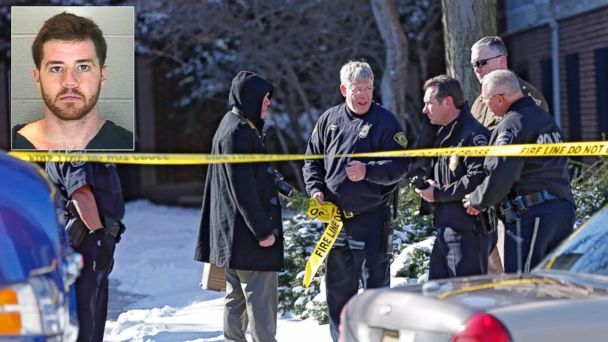What the Purdue Shooting Tells Us About Gun Violence Fatigue

Police from West Lafayette and Purdue University gather after shots were fired, Jan. 21, 2014, on the campus of Purdue University in West Lafayette, Ind. (John Terhune/Journal & Courier/AP Photo)
It was only a little more than a year ago that the school shooting at Sandy Hook elementary school in Newtown, Conn., shook the country into a national conversation about gun violence.
But on Tuesday, when police say a gunman walked into the electrical engineering building on Purdue University's campus and killed a fellow student, thrusting the campus into lock-down, many felt it was just another, run-of-the-mill school shooting event.
The Purdue killing followed on the heels of a string of school shootings in recent months, including one where two students were shot at a Philadelphia charter school on Friday, one at Widener University in Philadelphia Monday, and one in New Mexico on Jan. 15.
And just today, the University of Oklahoma was put on lockdown and SWAT teams were called in after a faculty member mistook loud bangs outside of a building as gunshots. The campus president said that teachers were "on edge" because of the violence happening around the country.
Reactions on Twitter to the latest outbreak of violence showed a mix of disappointment and weariness at yet another headline of student violence.
@ABC @currycolleen Our daily school shooting.
- Marianne (@flipsville) January 22, 2014
At this point homeschooling should really be an option " @ABC: 1 dead in Purdue University shooting: http://t.co/MHrVE8pVd3 - @currycolleen" - Lulu (@TheyCallMeLuci) January 22, 2014
One school shooting veteran and safety expert said the feeling could be attributed to the fact that Monday's shooting appeared to be targeted, not random.
Bill Bond, who was principal of Health High School in Paducah, Ky., when a student opened fire on a prayer circle there in 1997, said that the nation reacts more to school shootings and tragedies in general when the violence is senseless and appears to have no motive or rationale.
Bond now works as a school safety specialist at the National Association of Secondary School Principals.
"I think we were so shocked and horrified by Sandy Hook that it's in our consciousness. And when we think of a school shooting and it's something like in Purdue, where it appears there was a grudge or a rationale for it, it wasn't a random school shooting. That's not a national event any more than most other shootings would be," Bond said.
Police apprehended suspect Cody Cousins, 23, moments after the shooting. He is accused of killing teaching assistant Andrew Boldt, 21, in the basement of the engineering building around noon Tuesday. Campus Police Chief John Cox said witnesses believed the shooting was an "intentional act," but are still investigating a motive.
Bond said the one-on-one shooting was part of the reason it didn't rise to a national level.
@ABC @currycolleen another one? People need a purpose in life other than shooting each other. Let's build relationships and spread love - denise prado (@deniprado) January 22, 2014
@ABC @currycolleen my gosh,what s wrong with young people of usa
- SERGHINO MCGARRETT (@MBKSTREE) January 22, 2014
Bond pointed to the Boston bombing as another example of a tragedy that struck what he called "the national consciousness." Though there were only three deaths, the randomness and lack of clear rationale left the nation shaken, he said.
"When it's random and there's no rationale for hostility between the kids, just a completely random shooting like I experienced at Health, where the shooter had no grudge whatsoever against anyone he shot, those strike that national tone," Bond said. "The one in Purdue looks like it was a targeted shooting as opposed to a random shooting, that's not going to strike a national tone.